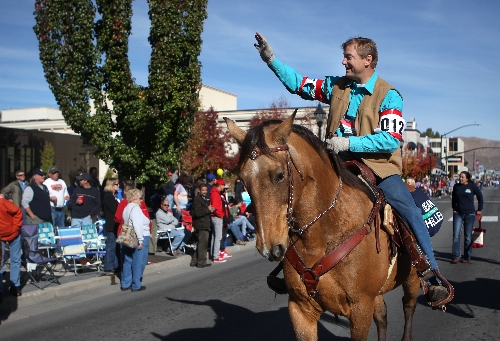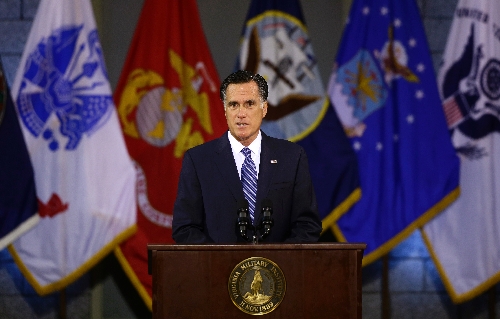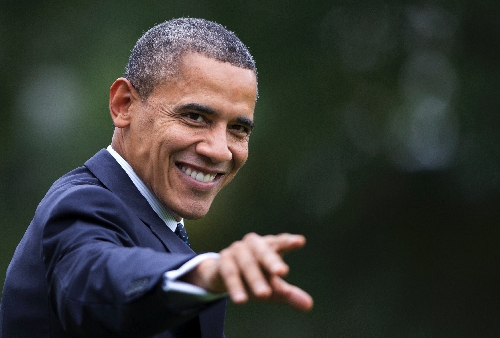Political parties look to presidential race to bring local candidates on coattails
In back-to-back visits to Las Vegas and Reno, President Lyndon B. Johnson in 1964 made the difference in the U.S. Senate race, helping Howard Cannon hold his Democratic seat against GOP challenger Paul Laxalt, then lieutenant governor. Johnson won in a landslide, all but dragging Cannon across the finish line.
The winning Senate race margin was 84 votes after a recount.
This Election Day on Nov. 6, Rep. Shelley Berkley is counting on riding President Barack Obama's coattails to a narrow Nevada victory. She is looking for the Obama-fueled Democratic machine to provide enough of a ballot boost to let her run past Republican U.S. Sen. Dean Heller, who is leading by several points in most public polls.
And so it goes in presidential election years when the White House contest can determine the fate of the men and women seeking Senate and House seats in down-ticket races. Nevada history is full of such lessons, say political analysts and academics who see the Heller-Berkley matchup as one for the books.
"Cannon did get elected on the coattails of LBJ," said Nevada historian Guy Rocha. "If Clark County goes big for Obama, then Berkley can win. A close win by Obama may not be enough for her. At the time, the Cannon-Laxalt race was the closest in U.S. history. The Heller-Berkley race has the potential to be that close."
That's why Berkley has been cozying up to the president and first lady Michelle Obama each time they visit Nevada, especially Clark County where Democrats dominate and need to drive up the vote to win. Berkley attended Obama's Wednesday night rally in Las Vegas as well as the first lady's Friday campaign stop here.
Heller, too, appeared this past week with Romney and his running mate Rep. Paul Ryan, R-Wis., at a Henderson rally. The better the GOP ticket does as a team, the better his chances to hold Berkley off, the thinking goes.
In analyzing the dynamics, the first question is whether Obama will beat Romney in Nevada, one of nine battleground states that will decide the White House race and that will be hotly contested through Nov. 6.
Both campaigns see victory within reach, although the 90,000 Democratic voter registration advantage over Republicans gives Obama a lead out of the box during the two-week early voting period that began Oct. 20.
Republicans must narrow the gap and hope a higher Election Day GOP turnout puts Romney over the top. Picking up more independent voters and late deciders also can swing the election either way.
If Romney wins in an upset here, Heller almost certainly will, too. That's because the senator has been outperforming Romney in the polls, leading Berkley while Obama has been leading his GOP challenger.
If Obama beats Romney by too slim a margin, his efforts won't likely be enough to help Berkley defeat Heller.
If Obama wins by 6 percent to 8 percent, "then he drags Berkley ... over the finish line with him," said David Damore, a political science professor at the University of Nevada, Las Vegas who has studied public and internal polling in the race. "If it is less than that, then we will have a real nail-biter for the Senate race."
Looking at previous presidential elections in Nevada, Damore said he sees parallels between Obama now and President George W. Bush in 2004 in how they have run their re-election campaigns.
Bush used the power of the presidency to generate enthusiasm among key voter constituencies much like Obama has done, Damore said.
As an example, Obama used his executive power to halt potential deportations of young immigrants brought illegally to this country by their parents. Obama also repealed the Pentagon's "don't ask, don't tell" policy to allow openly gay troops to serve in the military. He also expressed support for gay marriage.
Those moves undercut Romney's perceived strength on the economy, where Obama is most vulnerable, Damore said.
He compared it to Bush's main vulnerability on foreign policy compared to U.S. Sen. John Kerry, D-Mass., a Vietnam veteran who lost despite the unpopularity of the Iraq War.
Exit polls showed three out of five late-deciders picked Bush, who won Nevada and re-election, Damore said.
Republicans had a strong ground game in Nevada in 2004, while the Democrats were weaker - a situation that is reversed today, although many of the old GOP-Bush team are helping the Romney campaign this year.
"I have thought all along that the Obama campaign is rerunning the Bush 2004 campaign," Damore said.
In 2004, however, the presidential race didn't affect the Senate contest. U.S. Sen. Harry Reid, D-Nev., easily won re-election against a weak opponent. Berkley isn't so lucky, Damore said.
Heller is likely to run 10 percent to 15 percent better among Latinos than Romney, according to polling data Damore has studied. Heller also will do better than Romney in Washoe County, where the senator is well known after representing Northern and rural Nevada for three terms in Congress.
Berkley, a seven-term congresswoman from Las Vegas, hasn't made much progress among voters in Northern Nevada, Damore said.
Rural Nevada is GOP land, and both Romney and Heller are expected to get two-thirds of the vote there.
Rocha, the former Nevada archivist who has followed elections closely, said history shows the state's voters are notorious ticket-splitters, too, which means there will likely be plenty of Obama-Heller voters, especially outside of Clark County where Obama and Berkley will run the strongest.
More memorable, however, are times the president has saved the same-party Senate or House candidate thanks to long coattails, Rocha said, including when races are historically close as in the case of Obama versus Romney.
2008: OBAMA vs. McCAIN
Barack Obama swamped his GOP opponent, U.S. Sen. John McCain, R-Ariz., in Nevada by 12 percentage points, 55 percent to 43 percent. The revved-up Democratic Party machine allowed Dina Titus to unseat Republican Rep. Jon Porter by nearly 5 percentage points (47 percent to 42 percent) in the battleground 3rd Congressional District.
In Clark County, Obama won by nearly 124,000 votes while Titus beat Porter by nearly 18,000 votes. Two years later, Titus narrowly lost to U.S. Rep. Joe Heck, a Republican who this year is leading his Democratic challenger, Assembly Speaker John Oceguera, in the split-party district.
Obama's coattails would have to be very long to push Oceguera to victory.
The president, however, could help Democratic state Sen. Steven Horsford blow past Republican Danny Tarkanian in the new 4th Congressional District. Democrats have a voter registration advantage of more than 10 points in the 4th District already.
1948: TRUMAN vs. DEWEY
Most political prognosticators believed President Harry S. Truman would be defeated by Republican Thomas E. Dewey, but the president defied expectations and won re-election. In Nevada, Truman's margin was only 1,934 votes. Truman carried Clark County thanks to the labor unions, Rocha said, and his efforts helped Democrat Walter Baring knock off GOP incumbent Rep. Charles Russell by 761 votes. At the time, Nevada had only one congressional seat so candidates had to run statewide. Russell later was elected Nevada governor.
1952: EISENHOWER vs. STEVENSON
Dwight D. Eisenhower, a popular Republican war hero, smashed Illinois Gov. Adlai Stevenson, ending 20 years of Democratic control of the White House. In Nevada, Eisenhower helped Republicans win a Senate seat and pull off a House upset with Clifton Young knocking off Rep. Walter Baring by 771 votes. In the Senate race, George Malone beat Thomas Mechling by 2,722 votes, helping the GOP gain the Senate majority.
1932: FDR vs. HOOVER
Democrat Franklin Delano Roosevelt crushed President Herbert Hoover, whose policies were blamed for causing the Great Depression. In Nevada, FDR's coattails and the labor unions building the Boulder City/Hoover Dam helped Democrat Patrick McCarran, a Northern Nevadan, upset two-term Republican Sen. Tasker Oddie, by 1,692 votes. Republicans lost 12 Senate seats and control of the upper chamber that year.
1912: WILSON vs. TAFT vs. ROOSEVELT vs. DEBS
Democrat Woodrow Wilson won in a rare four-way contest in which Republican President William Howard Taft was defeated. Former President Theodore Roosevelt created his own party nicknamed the "Bull Moose Party" to run, and Eugene Debs was the Socialist on the ticket. Wilson won only 42 percent of the popular vote, but it was good enough for victory in the four-way race.
In Nevada, Democrat Key Pittman got an extra lift from the top of the ticket to eke out an 89-vote victory in a four-way special election, beating out the appointed incumbent, Republican Sen. William Massey.
Pittman was in the Senate until his death in 1940, becoming the longest serving senator from Nevada.
1964: JOHNSON vs. GOLDWATER
Lyndon B. Johnson had been in office less than a year, taking over for the assassinated President John F. Kennedy. He easily beat his GOP challenger, Sen. Barry Goldwater of Arizona, who was unpopular within his own party because of his conservative views. In Nevada, GOP leaders persuaded then-Lt. Gov. Paul Laxalt to run for the Senate against the Democratic incumbent, Sen. Howard Cannon. LBJ made his Vegas-Reno trip to ensure Cannon's re-election when it looked like the popular Laxalt was running a credible campaign.
"Laxalt said LBJ's basic speech was, 'I can't possibly survive in Washington without Howard,' " said Tom Loranger, a longtime business and political associate of Laxalt's in the capital.
The final blow to Laxalt's campaign came when Goldwater decided to visit Las Vegas just ahead of Election Day. Laxalt's advisers told him to avoid Goldwater at all costs since it was clear Johnson was winning. But Laxalt said he couldn't duck the Arizona senator because he considered him a friend, Loranger said. So Laxalt met Goldwater on the airport tarmac.
Photos of the two men shaking hands played across the front pages of Nevada newspapers, "And that was the final straw," Loranger said, chuckling.
Elections can and always will be unpredictable, however.
Ten years later, Laxalt defied the odds by winning a U.S. Senate seat against then-Lt. Gov. Harry Reid, now the Democratic Senate majority leader. It was not a presidential election year, yet the White House was a drag.
In 1974, President Gerald Ford had just assumed office after President Richard Nixon resigned under the cloud of Watergate. It was not a good time to be a Republican, especially after Ford pardoned Nixon. Laxalt dropped 10 points in the polls after that, Loranger recalled, suddenly making it a tight contest.
Yet, Laxalt still won - by a mere 674 votes, becoming one of the few Republicans in the country to win that year. Reid had gone too negative at the end of the campaign and turned off too many voters.
As for the Heller-Berkley race, Loranger said he sees things through partisan eyes. He believes Heller will win and Obama won't have coattails long enough to save Berkley from defeat.
"I just don't know if coattails will work in this instance," Loranger said. "I think you need a guy who wins big time. I can see people voting for Barack Obama and then turning around and voting for Dean. I just don't see very many people voting for Romney and turning around and voting for Berkley."
Contact reporter Laura Myers at lmyers@reviewjournal
.com or 702-387-2919. Follow @lmyerslvrj on Twitter.






















